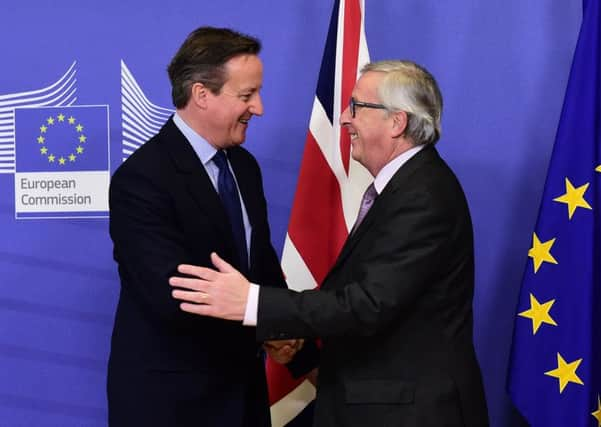Cameron dismisses EU benefits brake offer as '˜not good enough'


David Cameron insisted progress was being made on his reform demands ahead of a crunch summit of EU leaders next month but the proposal on offer “needs more work”.
Mr Cameron said he could not be “certain” a deal would be reached with the 27 other EU leaders and said no deal would be done if his concerns were not addressed.
Advertisement
Hide AdAdvertisement
Hide AdDuring a hastily arranged trip to Brussels yesterday, Mr Cameron held talks with European Commission president Jean-Claude Juncker and European Parliament president Martin Schulz in a bid to keep his agenda on track.
He had demanded a four-year ban on migrants from other EU countries claiming in-work benefits in the UK. The proposed compromise mechanism would apply across all 28 member states.
Speaking in the Belgian capital, he said: “There is now a proposal on the table, it is not good enough, it needs more work but we are making progress.
“I want a system where you have to pay in before you get out. We don’t want a something for nothing society.That’s what we are determined to deliver.
“We’ve made some progress today, it’s not enough, it’s going to be hard work. I can’t be certain we will get there in February but I will work as hard as I can to deliver a good deal for the British people.”
A deal at the 18-19 February summit is seen as vital if Mr Cameron wants to hold an early referendum on EU membership, because an agreement at a later date would make it hard to schedule a vote before the school summer holidays.
However, Polish foreign minister Witold Waszczykowski indicated he would not back the brake mechanism.
“It will not accept a mechanism that denies social benefits to Poles living in the European Union,” he said.
Advertisement
Hide AdAdvertisement
Hide AdIt is thought that the proposed measure would be available to all EU states, and be activated when migration levels were deemed high enough to put public services or welfare systems under severe strain. Migrants from the EU would then be barred from claiming in-work benefits for up to four years.
Crucially, it is believed national governments, rather than EU officials, would decide when to apply the brake.
Czech minister Tomas Prouza said the plan had been discussed when Mr Cameron visited Prague earlier this month. He expected the brake to be applied “as soon as the deal is struck” .